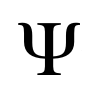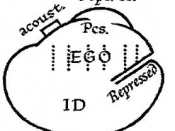Sigmund Freud divided the human psyche into three parts: the ego, the superego and the id; balance between the three was deemed essential for mental health. Over the course of "Lord of the Flies", Ralph, Piggy and Jack increasingly personify the attitudes, ideals and drives of the ego, superego and id, respectively. The interactions between the boys at the beginning of the novel are different from those of the middle and end; the loss of balance between the boys is an important theme in the novel, as it explains the descent of the boys into savagery and reflects on modern society in general.
The beginning of the book identifies the characters in their respective roles. Piggy, who finds little good with the conduct of the boys, is the superego or "the internalization of standards of morality and propriety" (Abrams 249-250). He helps to establish order by introducing the conch; he also scorns the boys for "acting like a crowd of kids" (Golding 42).
Piggy's nemesis comes in Jack, the large, rude leader of the choir. Jack is the id of the boys, incorporating "libidinal and other primal desires" (Abrams 249). He volunteers himself and his choir mates as hunters--a decidedly primal job. The balance of the two boys is Ralph, who both laughs "delightedly" (Golding 11) at the prospects of the wild island, and thinks quickly to establish a signal fire. Ralph is the ego, which "tries as best it can to negotiate the conflicts between the insatiable demands of the id [and] the impossibly stringent requirements of the superego" (Abrams 250). He is well suited to the job, as he is chief: this allows him to both control and listen to the wills of the id and superego. All goes well with the tribe of boys--their...


